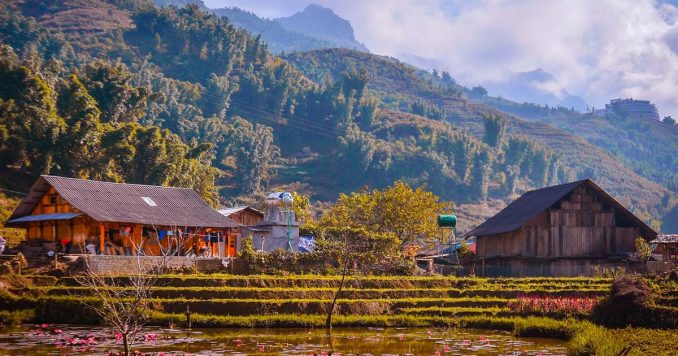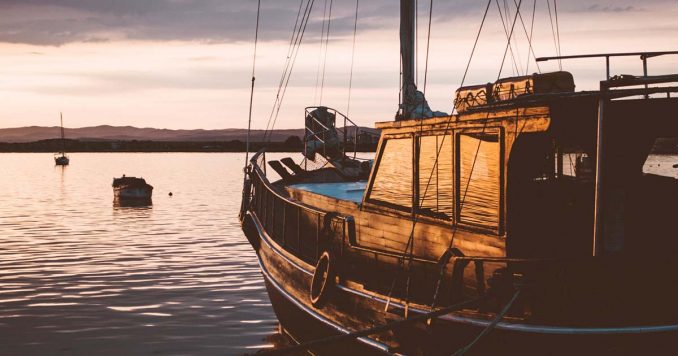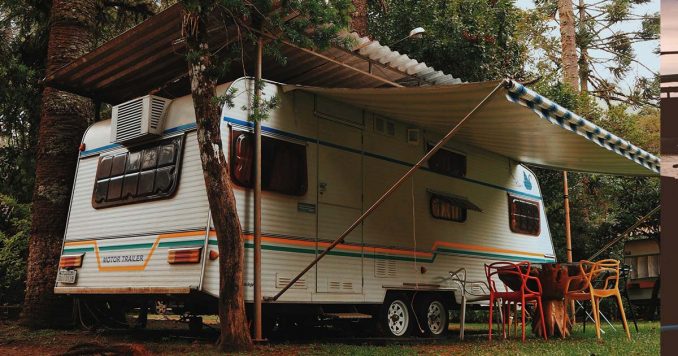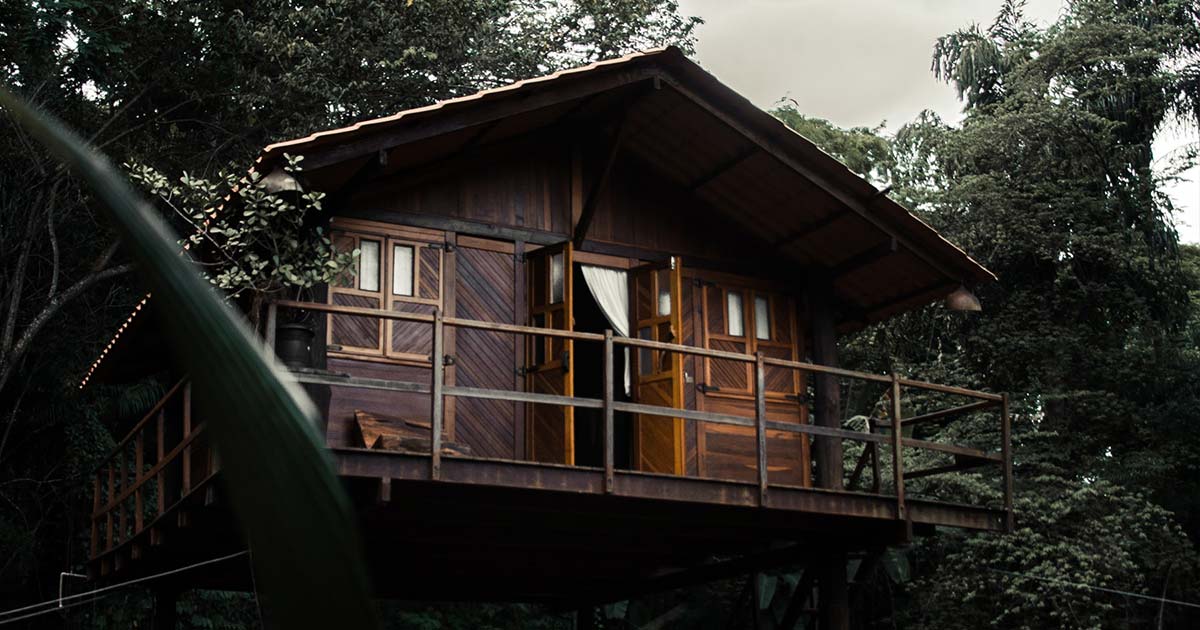
Off grid living is something a great many preppers strive for. There are of course many different ways one could live off the grid, and it boils down to how you want to live and sometimes where you want to live. While it is possible in some areas to live off the grid in a tent, or crude shelter, most people’s off-grid living plans focus around a cabin of some sort on rural property. However, off-grid living on boats and RV’s are also possible. Let’s take a look at three ways folks go off the grid, plus the pros and cons of each method.
Off Grid Cabins

Perhaps the gold standard of off the grid living, cabins of some sort are an ideal way to live disconnected from society. There are a lot of benefits to off grid cabin living, including owning your own land, plenty of room for gardens, livestock, and outbuildings, plus if you have enough land, you’ve got a lot of privacy options.
Another important aspect of off grid cabin living is the fact you can build a permanent system of your own. A well, solar panels, generator facilities, fenced in pens for your livestock, fruit orchards, the list of self-sufficiency aiding improvements you can install to support yourself go on and on.
Going off the grid and building a cabin can require a substantial investment though. Livable land isn’t always cheap, and installing a well, and power generation facilities can get expensive real quick. Battery banks and solar panels add up in cost, and you’ll probably be spending a good bit of time each year preparing firewood to keep warm over the winter.
However, when you consider the overall benefits of your own off grid stronghold, it’s hard to beat a cabin if you can afford it, or have the patience to slowly build up your ideal system while dealing with the compromises in lifestyle that come with that approach.
Self-sufficient Living Resources
Off the Grid Cabin Living Books:
- The Encyclopedia of Country Living: The Original Manual for Living off the Land & Doing It Yourself – This is one of the best books out there for preppers, homesteaders, and urban farmers who are looking to live off the land!
- Going Off the Grid: The How-To-Book of Simple Living and Happiness
- The Homesteading Handbook: – A Back to Basics Guide to Growing Your Own Food, Canning, Keeping Chickens, Generating Your Own Energy, Crafting, Herbal Medicine, and More
Free Articles and Resources for Cabin Living:
- Living off the Grid: What it means, how to do it, and everything you need to know about the lifestyle.
- Buying Off-grid Rural Land: Safety considerations when purchasing off-grid property.
- Solar Panel Primer: How many solar panels and Batteries do you need to run your home?
- Container Gardening: Learning how to grow a survival garden.
- Off-Grid Battery FAQ: Your battery bank is the foundation of your off-grid setup, find out exactly what you will need to power your home.
- OFF-GRID Internet: How to get Internet Access when living off the grid
Off Grid Boating: Living aboard a Boat

This is one I have several years of experience with. Having lived off the grid on a couple of different sailboats, I can tell you there is a lot of freedom, and also a lot of headaches that comes with living off grid on a boat.
One of the biggest advantages an off-grid boat has is that it is fully self-contained, and can be equipped with solar and wind power generation, plus a battery bank for a fraction of what a cabin might cost. The compact nature of a boat readily lends itself to quickly equipping an off-grid power system, while the internal 12 volt electrical systems that prevail on boats don’t require much power to operate.
However, there are serious potential drawbacks. Boats by their very nature are restricted in size. Even large cruising boats can be cramped compared to shore living. There is also a very finite amount of supplies that can be stored onboard, which is limited by the size of the boat, and weight of the supplies. Running a refrigerator can also be a big power draw, requiring a larger battery bank and probably a generator (although boats with inboard engines can maintain a battery bank with relative ease.)
Perhaps the biggest drawback though is the legal and practical issues of living off-grid on a boat. Going off grid typically means being away from a dock or any sort of shore facilities. This means anchoring out or using a mooring ball. In many jurisdictions, the places and amount of time you can spend anchored out may be restricted by law, or there may be difficulty in securing a mooring.
Waste disposal and water storage is another big problem, as you must either use a composting toilet, porta potty, or bring your boat to a pump out facility on a regular basis to drain your waste tanks, and take on more fresh water.
You also have practical issues with comfort and safety during storms. On the other hand, if you have a good boat, and a good mooring setup, or simply want to cruise around and live a nomadic life, there is a lot to be said for off grid living on a boat.
Boat Living Resources
Living on a Boat Books:
- Nigel Calder’s Cruising Handbook: A Compendium for Coastal and Offshore Sailors
- The Essentials of Living Aboard a Boat
- The Liveaboard Report: A Boat Dweller’s Guide to What Works and What Doesn’t
- Get Real, Get Gone: How to Become a Modern Sea Gypsy and Sail Away Forever
Additional Resources:
- Living on a Boat: A guide to living at sea. How to choose a boat, where to dock, and other safety considerations.
Off Grid RV’s: Full-time Trailer Life

An off the grid RV offers many of the benefits of an off the grid cabin, with those of an off the grid boat, while adding some unique twists of its own – and some unique drawbacks.
Just like with a boat, it is very easy to take advantage of the self-contained nature of an RV and turn it into an off-grid living option. In fact, it might be slightly easier, because RV’s operate on the land, and don’t bring with them the unique sets of safety and operational issues that watercraft do.
Off grid RV’s can be broadly grouped between motorhomes and towable RV’s like travel trailers and fifth wheels. The difference in a broad survey article like this is largely negligible, and there are pros and cons to each approach.
A standalone motorhome has the benefit of not requiring a tow vehicle. You simply get in it and drive it to wherever you are going. Usually, there are onboard generators, a generous battery bank, plus water and waste storage, plus all the (miniaturized) comforts of home.
On the other hand, a towed RV allows you to drop your off grid retreat where you want it, and still have a vehicle to drive around in, without having to tow one behind a motorhome. However, many trailers and fifth wheels lack some of the features of motorhomes like onboard generators.
Regardless of what RV you choose, if you park it on your own property, you’ve got a turn key off grid home that requires little extra investment on your part. If you have a septic tank and well, then your water and waste issues are easily dealt with. Solar panels, wind generators, and portable generators all can combine to provide whatever power you need for your off grid living experience.
There are two major drawbacks of off grid RV living, and that is weather and durability. RV’s are simply not designed for year-round full-time living, and in order to make a light roadworthy vehicle, things like insulation and weatherproofing might be skimped on.
It is extremely hard to keep an RV warm and comfortable in cold weather, and the off gridder who choses an RV should either be in a temperate climate, or take extreme care with weather proofing. I’ve lived in an RV in single digit temperatures, and it wasn’t pleasant. The amount of fuel and electricity I had to consume to keep it warm was crazy, and I wound up partitioning off each room with heavy blankets, and only heating them if I had to be in them.
It’s a bit easier to cool an RV in hot weather if you have a good air conditioner, but again, they are energy hogs, and that can be problematic off the grid. You are better off using an off grid RV as a temporary solution unless you are in a mild climate.
Somewhat related is the fact that RV’s simply don’t hold up to long term use. As I already mentioned, they aren’t designed for daily, 24/7 use over a longer period of time. Things wear out faster, plumbing leaks, wiring won’t take heavy loads, moving parts wear out, the list goes on and on. However, if you start with a newer or well-maintained RV, and do your part keeping up on things, this problem generally can be negated.
RV Livings Resources
RV Living Books:
- A Beginner’s Guide to Living in an RV: Everything I Wish I Knew Before Full-Time RVing Across America
- Motorhome and RV Retirement Living: The Most Enjoyable and Least Expensive Way to Retire
- Living the RV Life: Your Ultimate Guide to Life on the Road
Free Articles and Additional RV Living Resources:
- Traveling the Country in an RV and How to Make a Living: A real-life profile of a couple who decided to travel the country while still working and making a living out on the road
- Throwing out the Rule Book: Traveling North America in an RV: The nomad lifestyle can give you more freedom and time than you ever thought possible. Learn how one couple got more deeply in touch with their own survival and learned to slow WAY down taking on the boondocking lifestyle.
- OFFGRID Living in an RV: Have you ever wonder what it would be like to live off the grid? Check out this unique family of five who has been traveling full-time in a 5th wheel RV since 2014.
Are you Ready to go off the grid?

Off the grid living is always going to be a series of compromises. When you alone have to generate your own power, pump and procure your own water, and deal with your sanitation issues, then you constantly are striving to make the process simple and efficient. Sometimes that means using less energy, sometimes that means expending more labor at some stage in the process.
How and where you choose to live off grid greatly influences these decisions. Living in an off grid RV in the Alaskan interior would be madness, while an off grid boat in central California would be quite pleasant.
What you select for your off grid lifestyle depends on your budget, your skill level, your commitment, and other matters that are unique to your situation. Having a family will impact your choices as much as not having a family. Having a steady income makes things easier, while owning your own land is a huge step forward.
However you choose to live off grid, the important thing is that you go into with both eyes open, and realistic expectations. Once you achieve that state of mind, the rest gets easier, and you move ever closer to full self-reliance!



Very informative article with excellent links. I live in an RV year round in northern Kansas. I am not off grid however I do live in a four season camper. It has insulation in the walls and floor. I do use a small space heater in the underbelly of the trailer to keep my water lines from freezing. Luckily mine has all pex water lines so if one does freeze it’s an easy fix.
nice piece of information .
I live in a rural community, so I have some experience with surviving off grid though we aren’t actually off grid. We have 5 acres of property and I have a lot of time on my hands, being a child, and so I decided to build my own shelter out of only ferns and sticks. Wasn’t easy but it works well even in storms that threaten to make trees crash.
That is my dream, not just for my husband and I but also for our children and their children, and now they are all starting to see the light. Soon, very soon we are almost ready, I pray that we are not too late.
We’ve been preparing for 10 years Pamela. With the threat from our own federal government, we are making some small changes to our plans but overall we can handle most anything. The pandemic was fairly easy to deal with both physically and especially mentally–because we have been preparing. We are always “improving” what we have done over the years and always looking to adapt to the ever-changing socio economic environment here in our country. One thing that was a little difficult was getting our families on board with preparing and in general we have done this but more work needs to be done. Locally we are good to go with very little problems from the local county government–fairly conservative and self reliant.
Before buying your land, PLEASE contact the Council about all of the costs AND THE COST OF THE RATES. Form a group of people if you wish. Survivalism must be sustained to be of any use, so plant those fruit trees and LEARN from the library books, even 2nd hand books with gardening and orcharding books. If you think you will get by without money or any income, realise thats’ a mistake. The Council will send demands for rates to pay on our land. If you form a group, have some good worker work for wages, even in the city, to save up for the rates. And climate counts, so eg in New Zealand, we cannot grow and process cane sugar, so grow a herb called STEVIA, that is easy to process into sugar. Solar Power seems a good idea. You are LOVED, too.
I should have said about Stevia, it processes into sweetener. In NZ we can buy Stevia herb with seeds available at Kings Herb Seeds, Katikati, Bay of Plenty, New Zealand also by MAIL ORDER. They are a good honest and kind business and sell some Organic seeds too. And are online too. Hint: for most medical alternatives, try growing Basil herb or better, Sacred or Holy Basil the perennial and eat some leaves daily, it’s a natural antibiotic.
But alternative medicine can be not always better so check about a doctor.